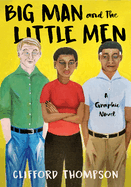
For Clifford Thompson (What It Is: Race, Family, and One Thinking Black Man's Blues), the graphic novel Big Man and the Little Men is a new frontier in terms of form. But it's also entirely of a piece with Thompson's previous books, which address thorny social issues with a counterintuitively gentle touch.
As Big Man and the Little Men begins, Metropolis magazine has invited April Wells--a Black, New York-based memoirist who has appeared on Oprah--to write about William Waters, the Democrats' white presumed nominee for president. April took the assignment fully aware that Waters, who has a wife, has been accused of sleeping with male staffers. (He denies it.) While April is on the campaign trail with Waters, she's contacted by one of his former female staffers, who says "there's something you need to know" about the candidate. April feels increasingly out of her depth as things get dicier. At one point she thinks, "Here's where it would help to have gone to journalism school. Why did they ask me to do this? And why did I say yes?"
Thompson's art has a straightforwardness that allows readers to practically see the gears turning in the characters' minds. Among the most potent images are wordless panels showing April in private moments: writing, pacing in her hotel room and so on. These illustrations reinforce the point that for all the political intrigue afoot, Big Man and the Little Men never ceases to be April's story--and it's the sort that lingers. --Nell Beram, author and freelance writer

